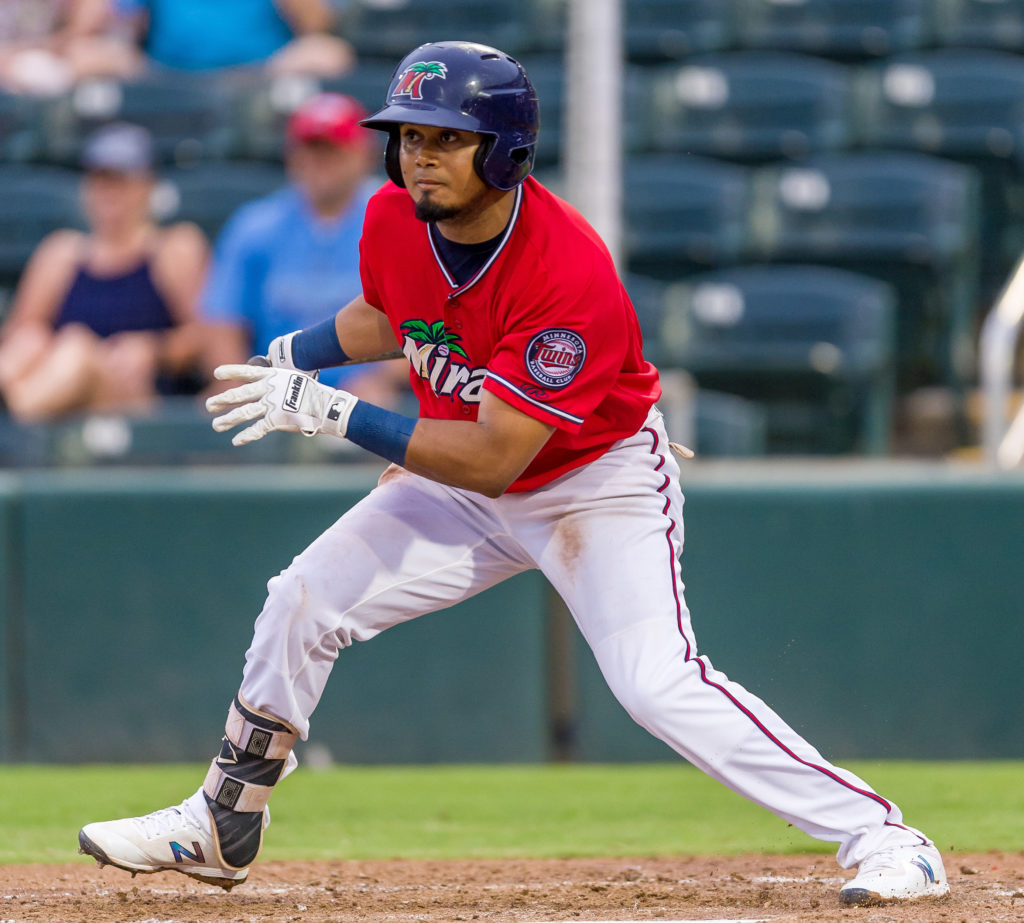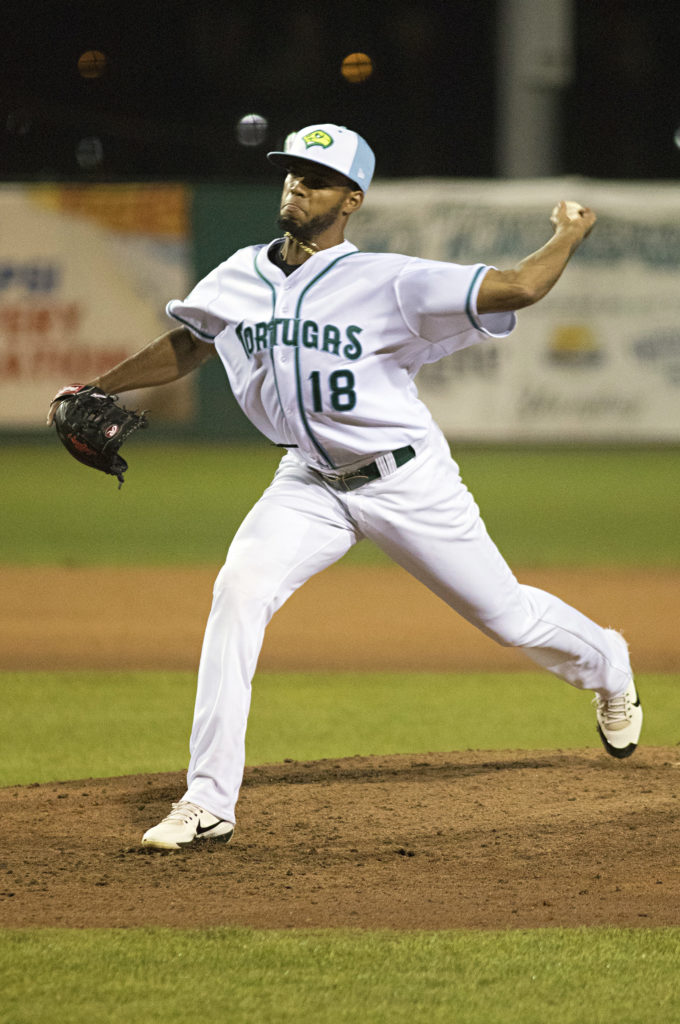Latin American baseball players face hurdles in their quest to reach the big league
Pitcher Juan Martinez has spent nearly seven years in the minor leagues and his routine for practically every game day has remained the same: get up early, take a shower, drive to the team’s stadium and eat a bit before warm-ups.
Throughout his career, the Dominican-born pitcher has struggled with low wages and difficulty mastering English.
But Martinez persists, with dreams of reaching the big leagues so he can buy his mother the home she has always wanted.
Martinez signed with the Cincinnati Reds as a free agent in 2011 and played for several teams in the minor leagues, including most recently, the Pensacola Blue Wahoos. Like many other Latin-American born minor league players, he has faced struggles that are unique to those born outside of the United States.
According to The Guardian, half of all minor leaguers are Latino.

Many of these players are unable to speak English as fluently as they can speak Spanish. As a result, some of them have a much more difficult time in the minor leagues than their English-speaking counterparts.
“Here in baseball, you need to know the language in case someone tries to explain a situation in the game to you. You need to be able to understand,” Martinez said in Spanish. “If you don’t speak English, you won’t know what to do and you’ll be lost.”
On top of language barriers, these players also have to deal with the hardships and financial struggles that come with playing in the minor leagues.
In this hierarchy of professional baseball teams known as Minor League Baseball, players try to work their way up the different minor league levels to get to the highly coveted major leagues.
Every franchise in the minor leagues has a network of different teams primarily used to develop talent. These leagues are also made up of players signed as free agents or players drafted straight from college in the minor league draft. This was the case for Eric Sim, a former pitcher from Canada.
Sim and his family moved from South Korea to Canada when he was 13. He later played for Colby Community College in Kansas for two years before transferring to the University of South Florida where he was drafted by the San Francisco Giants as a junior in 2010.
He played across the minor leagues for six seasons before being released by the Salem-Keizer Volcanoes in 2015. He’s stopped playing professional baseball since then.
“It’s a life of peanut butter and jelly and just traveling and not getting paid enough,” Sim said. “My paychecks were roughly around $400 every two weeks.”
According to Statista, the average player salary in Major League Baseball was about $4.52 million in 2018. In comparison, players in the minors can only earn a maximum of $1,100 a month during their first season.
“My rent was $500, so my one paycheck went straight to the rent and that’s if you don’t include utilities and stuff,” Sim said. “Another check I got was for another $400 and you have to spend that on food and stuff. So it’s pretty tough, man.”
Mike Ashmore, a reporter who currently covers the Somerset Patriots and covered the Trenton Thunder in the minor leagues from 2008-2013, said players often have to take up other jobs during the offseason to make ends meet. He said there was even an instance where a player named Edwar Gonzalez, had a side job during the actual season.
“He was a groundskeeper at the field he played at,” Ashmore said. “He would do stuff during the season to make extra money, but guys have also done things like valet service and construction jobs.”
While some teams allow their players to work other jobs during the season and training, others are much more hesitant in having their players do work other than baseball.
Sim said he’s been through experiences where managers would call out players for working other jobs. They would actively discourage it in front of everyone, but Sim said most players still had offseason jobs anyway.
“You’re definitely not allowed to get another job, other than playing baseball, especially in spring training and extended because during the season you just don’t have time for that,” Sim said. “You’re home for a week and then you’re away for a week.”
Many immigrant players are from Latin America.
“Even outside of baseball there are difficulties, like if you’re going out to eat and you need something,” Martinez said in Spanish. “It’s just good to know English.”
Luis Arraez, a second baseman for the Chattanooga Lookouts in Tennessee, said being unable to speak English in the minors is challenging but that his teams in the past have helped accommodate him and his teammates.
We have translators who help us communicate with everyone else,” Arraez said in Spanish. “We also have English classes two days a week.”
Arraez was born Venezuela and played for Magallanes in his native country before signing to a minor league contract with the Minnesota Twins in 2013 as a free agent. He has played in the United States for four years and is currently in his first year of living in the country with his wife and daughter.
Despite the accomodations, life as a minor leaguer is still financially difficult for players like Arraez. The second basemen said there are few things the players don’t have to pay out of pocket for.

“They pay us to play and that’s really it,” Arraez said. “We get a discount with food but it’s really nothing much.”
Without much income, many Latino players struggle financially, especially those supporting their families back in their native countries.
Eric Sim, a former minor league pitcher, said he had a teammate from the Dominican Republic who would use his $400 paycheck to send $200 back home to his family. Although the money helped his family, he would have to survive in the United States with half a paycheck.
“When you’re put in that situation to support your family, it’s rough, man,” Sim said in Spanish. “A lot have gone through worse than I have, for sure.”
Many players go through these trials and tribulations of playing in the minor leagues in the hopes of reaching their dreams in the big leagues. Although many persevere despite the low wages, most players end up spending their entire careers in the minors with little to show for their work.
“I hope God helps me reach the major leagues so I can buy my mother the home she’s always wanted. I just want to help my family,” Martinez said. “My happiness comes from knowing my mother is living well and seeing her smile again.”
Email: latinoreporter@gmail.com
Twitter: @JuanHSports